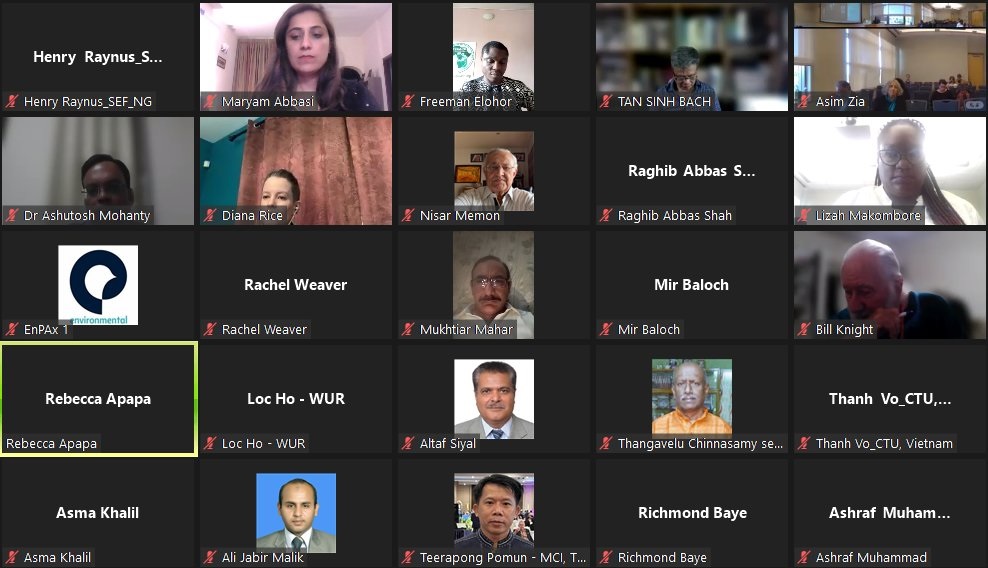By Ali Imran
ISLAMABAD: The speakers at the webinar, highlighting growing challenges to river deltas across the world on Sunday, emphasised that there were shared problems of the river basins such as sea level rise, flooding, salt water intrusion, forced migration, water scarcity and water security, therefore the solutions should also be shared and urgent climate actions should be taken to address environmental degradation.
The hybrid event “Community Voices-Deltas Unite: Urgent Call for Climate Action with a United Nations Convention for Conserving River Deltas (UN-CCRD)” was organized by The African Centre for Climate Actions and Rural Development Initiative (ACCARD) in collaboration with TWIN (Transboundary Water, In-Cooperation Network), Consortium for Capacity Building (CCB), Water Environment Forum Pakistan and Government of Bayelsa State, Environmental PeaceBuilding Organization and partners, said a news release issued here Sunday.
The speakers said the local communities need to have a voice at the UN and with their governments. “The proposed convention needs to provide opportunities for local communities to be at the same table.
Community voices have been at the center of the UN Convention on Conserving River Deltas from its inception and will continue to be focal in its drafting,” they added.
The speakers at the event were communities and stakeholders from Indus River, Nigerian Niger River, Mekong River, Congo River, and Saint Lawrence River basins. The delta regions of each of these basins are vulnerable to accelerating sea level rise and saltwater intrusion from the oceans, rapidly changing (water or river) flow from melting glaciers, increasing dams and shifting rainfall patterns in the highlands.
They added that Indigenous peoples and local communities are not only affected but are also among the most vulnerable to the growing adverse consequences of climate change on water resources.
The worsening climate crises underscores the urgent need for accelerated efforts to substantially address the growing impact of climate change on water resources leading to human migration especially among young people, water shortage, poverty, hunger and increasing communal conflicts as well as new disease outbreaks.
The United Nations can facilitate an international multi-stakeholder platform to provide the urgently needed dialogue and transformative action – to be called “United Nations Convention on River Deltas (UN-CCRD)”.
This platform will enable urgent action to gradually address the impending future water challenges and looming global crises of food, conflict and freshwater shortage. “About 0.5% of water on Earth is usable and not available as freshwater. Climate change is dangerously affecting water supply and security, globally. With a worrisome trend in the past 20 years is affecting water supply and security in many ways including flooding will further push the numbers of people at risk to floods from 1.2 to 1.6 billion people by 2050” said Susan Sgorbati Director at Center for the Advancement of Public Action (CAPA) at Bennington College. Community members Altaf Siyal, Mukhtar Mahar and Mir Baloch from the Indus river basin said, “the Indus Delta is challenged by seawater intrusions, coastal erosions, agricultural land degradation, degradations of wetlands, deteriorating groundwater quality with even arsenic and surface water pollution,” are mainly caused by reduced water flow from upstream to downstream, diminishing river flows to delta, & climate changes with temperature rises.”
Also, the Indus Delta currently facing extreme climate stress could be preserved through a multi-stakeholders collaborations at all levels, and encourage an adoption of the deltas Convention (UN-CCRD) from global to the district” said Senator Nisar Memon from Pakistan. Freeman Elohor, Founder and Centre Coordinator for African Centre for Climate Actions and Rural Development said that together with University of Vermont, University of Colorado, Nigeria’s Bayelsa State Government and Pakistani government have approached the United Nations (UN) at the March 2023 Water Conference in New York and recognised the need for a convention to protect river deltas as well as address climate and human rights related deltas issues. He informed that the launch would be at COP28 in Dubai in December 2023. That it will be a game changing collaborative one-stop solution that will blend indigenous knowledge with science, well coordinated government interventions with local communities across vertical and horizontal levels – will enable a global network of community scientists. In Freeman’s words, the UN-CCRD platform will resolve some of the existing and future concerns of the peaceful coexistence of sub-Saharan Africa (SSA), South Asian and South-East Asian communities with shared trans-boundary water resources. Also, help to mitigate the growing agitations of indigenous peoples and local communities including young people, women and elderly – mostly vulnerable to these cascading impacts and challenges in our deltas. Prof Asim Zia from University of Vermont said that “People living in coastal regions are facing forced migration because of rising sea levels”. Prof Tan Sinh Bach from Hanoi National University, Godi Godar from Congo River Basin, Diana Rice from Saint Lawrence River Basin, Prof Kevin Xu , Ho Huu Loc from Mekong River Basin and Emma Spett Saint Lawrence River Basin also spoke at the event.


